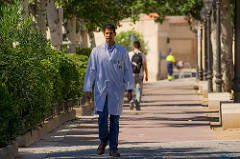Health professions are regarded as some of the most important occupations available, and they require an immense amount of knowledge and training. With so much to learn, many medical students are, on occasion, simply forced to memorize the facts instead of delving into the material and gaining a comprehensive understanding of the concepts. With the increase in the prevalence of this issue, new methods of learning and teaching are being tested.
One new method has been developed recently to help medical students better understand a very complex, yet common, neurological ailment: Alzheimer’s disease. In a new study conducted by Dr. James M. Noble of Columbia University Medical Center, several medical students were sent to attend a 90-minute art museum program designed specifically for people with dementia and their caregivers.
One student of the program stated that, “It gave us a chance to interact with patients with dementia in a context when their dementia isn’t the main focus, when we get to see what they are capable of more so than what they are incapable of—which so often is what cognitive tests force a patient to do.” This allowed for medical students to observe their patients in a more holistic sense. Simply observing them in a clinical background would not allow for a full analysis of the patient and how their dementia affects them on a daily basis. Being away from a clinical setting gave medical students a different perspective of the patients and what they were capable of, compared to prior misconceptions.
Following the program, a test was administered to the medical students to gauge their change in attitudes towards dementia. On a scale of 20 to 140, the average score for the medical students increased from 97 to 106. In general, most medical students of the program would feel more comfortable interacting with the Alzheimer’s patients.
Dr. Noble claims that, “A day at the museum might be a wise prescription for helping students become compassionate doctors.” Compassion can be extremely important, especially in modern times, in the medical field. Being able to understand where a patient is coming from and the circumstances outside of medicine that surround that patient can be extremely important when identifying issues, creating treatment plans, and interacting with the patients. Being a health professional is not only about treating a patient with the knowledge of medicine, but also about healing a patient with compassion.
Feature Image Source: Doctor by Tomek Nacho










